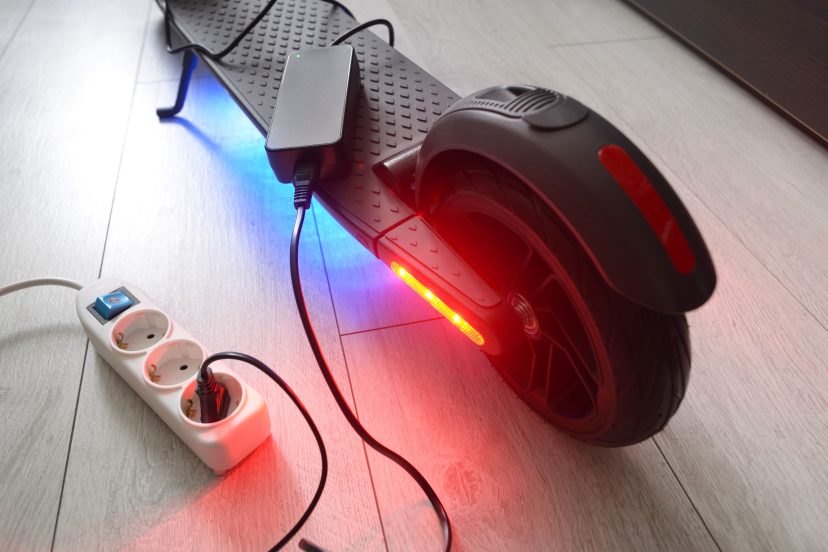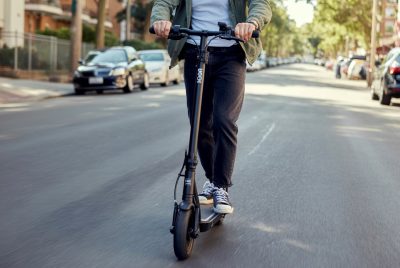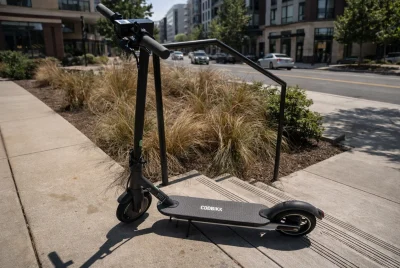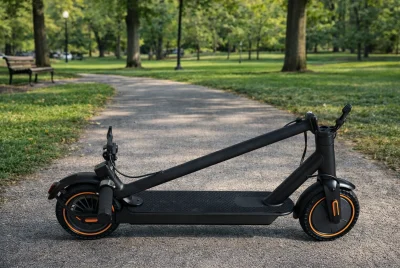Batteries for Electric Scooters
*We may earn a commission for purchases made using our links. Please see our disclosure to learn more.
Hello fellow scooter enthusiasts! Today, we’re going to delve deeper into the fascinating world of electric scooter batteries. As the powerhouse of your ride, batteries for electric scooters play a crucial role in determining how far and how fast you can go before needing a recharge.
In this comprehensive article, we will explore the different types of batteries used in electric scooters, their advantages, and how to maximize their lifespan.
Introduction to Electric Scooter Batteries
Electric scooter batteries play a vital role in both propelling and enhancing your ride. They are responsible for powering your scooter while also ensuring a seamless and pleasurable experience. These batteries have a significant impact on crucial aspects such as performance, range, and lifespan of your scooter.
Selecting the appropriate battery is crucial as it can make a considerable disparity in your overall riding enjoyment. It’s essential to choose the right battery for your electric scooter to optimize your riding experience.
Why Batteries Matter: The Heart of Your Scooter
The right battery not only powers your scooter but also ensures a smooth, enjoyable ride, affecting your scooter’s performance, range, and lifespan.
Types of Batteries Used in Electric Scooters
There are three main types of batteries used in electric scooters: lead-acid, nickel-metal hydride, and lithium-ion.
Lead-Acid Batteries
Enhance the performance of your mobility devices with the WEIZE 12V 35AH Deep Cycle Battery Set. Designed for reliability, these maintenance-free sealed lead-acid batteries offer versatile compatibility, making them suitable for scooters, wheelchairs, solar panels, trolling motors, and more. With a robust 35 amp-hour capacity, these batteries ensure extended run times, making them ideal for various electric vehicles. Please note the specific application requirements and dimensions to ensure compatibility.
- Maintenance-Free: Sealed Lead Acid Rechargeable batteries for hassle-free use.
- Versatile Compatibility: Ideal for scooters, wheelchairs, solar panels, trolling motors, and more.
- Extended Run Times: With 35 amp-hour capacity, provides prolonged usage for electric vehicles.
- No Wire Harness: Does not include wire harness or mounting, may require separate purchase.
- Specific Application: Compatibility may vary, and users should check markings and dimensions before ordering.
- Heavyweight: Hefty weight may limit use to 3-wheel and 4-wheel electric vehicles.
WEIZE 12V 35AH Deep Cycle Battery
Lead-acid batteries are the oldest and most traditional type of rechargeable battery. They are often found in entry-level electric scooters due to their lower cost compared to other battery types.
These batteries have been used for many years and are known for their reliability and robustness. Although lead-acid batteries are heavier and bulkier than other options, they still provide a decent amount of power.
Nickel-Metal Hydride Batteries
Nickel-metal hydride (NiMH) batteries are a step up from lead-acid batteries in terms of performance and longevity. They offer a better energy density, meaning they can store more power in a smaller package.
NiMH batteries are known for having a longer lifespan than lead-acid batteries, making them a popular choice among scooter enthusiasts who are looking for a balance between cost and performance.
Lithium-Ion Batteries
Upgrade and revitalize your electric scooter with the YLuBik Electric Scooter Battery. This lithium-ion powerhouse boasts a 36V 7.8Ah capacity, providing a reliable energy source for a maximum motor power of 250W. The battery is crafted for versatility, serving as a professional replacement for various electric scooter brands. Its compact design, measuring 12.6 * 1.57 * 2.76 inches, ensures easy installation and removal. The black hard plastic shell offers durability and protection, while the 15A BMS protection board ensures stable performance and a prolonged service life.
- High Capacity: 36V 7.8Ah battery for reliable scooter performance.
- Versatile Compatibility: Professional replacement suitable for various electric scooters (max 250W).
- BMS Protection: Equipped with a 15A BMS board, ensuring stable operation and preventing issues.
- Limited Compatibility: Not compatible with M365 Electric Scooter.
- Size Verification Needed: Users must ensure their scooter matches the battery size.
- Brand Specific: Tailored for specific scooters, may not universally fit all brands.
YLuBik Electric Scooter Battery
Lithium-ion (Li-ion) batteries are the most advanced and commonly used battery type in modern electric scooters. They are lightweight, have a high energy density, and charge quickly. Lithium-ion batteries offer the best range and longevity compared to lead-acid and NiMH batteries.
They are also known for their stability and reliability. However, they come at a higher price point due to their advanced technology.
The Advantages of Different Battery Types
Each battery type has its own set of advantages, which can help you make an informed decision when choosing the battery for your electric scooter.
The Benefits of Lead-Acid Batteries
Lead-acid batteries are renowned for their durability and dependability, rendering them a cost-effective alternative compared to other battery variants. This affordability makes them an ideal option for individuals new to electric scooters or those with budget constraints.
Although they may not match the energy density or longevity of lithium-ion batteries, they still deliver ample power to support numerous electric scooters.
Despite their comparatively lower energy storage capabilities and shorter lifespan, lead-acid batteries remain a reliable and robust choice, particularly for individuals seeking a practical and economical solution for their electric scooter power needs.
The Benefits of Nickel-Metal Hydride Batteries
Nickel-metal hydride (NiMH) batteries offer a cost-effective solution without compromising performance. With a longer lifespan than lead-acid batteries and superior energy density, they strike a balance between affordability and efficiency.
These batteries are particularly favored by riders seeking decent performance and durability without the hefty price associated with lithium-ion alternatives. NiMH batteries have proven to be a popular choice in various applications due to their reliable performance, relatively low environmental impact, and versatility.
Whether powering electronic devices or serving as reliable energy sources for electric vehicles, NiMH batteries continue to provide an optimal compromise for cost-conscious consumers.
The Benefits of Lithium-Ion Batteries
Lithium-ion batteries are the top choice for many electric scooter enthusiasts. They offer several advantages over other battery types. Firstly, they are lightweight, which helps to reduce the overall weight of the scooter. This, in turn, improves maneuverability and makes it easier to handle the scooter.
Secondly, lithium-ion batteries have a high energy density, meaning they can store more power in a smaller package. This allows for a longer range and more extended riding time.
Lastly, lithium-ion batteries charge quickly, enabling you to get back on the road faster. However, it’s important to note that lithium-ion batteries are generally more expensive than lead-acid and NiMH batteries.
Battery University – Types of Lithium-ion For those who want to delve even deeper into the science behind lithium-ion batteries, Battery University offers a comprehensive resource on the different types of lithium-ion batteries, their properties, and usage.
This information is valuable for electric scooter owners who want to understand the technical aspects of their scooter’s battery.
Understanding Battery Life: Factors That Impact Longevity
Several factors can influence the lifespan of your electric scooter battery. Understanding these factors and implementing proper maintenance practices can help you maximize the battery’s longevity. Some key factors to consider include:
Battery Type: The type of battery you choose for your scooter plays a significant role in determining its lifespan. As mentioned earlier, lithium-ion batteries generally have a longer lifespan compared to lead-acid and NiMH batteries.
Charging and Discharging: How often you charge and discharge your battery can affect its overall lifespan. It’s generally recommended to avoid overcharging or completely draining the battery. Instead, aim to keep the battery charge level between 20% and 80% for optimal health.
Scooter Usage and Storage: The way you use and store your scooter can impact the battery’s lifespan. Avoid pushing your scooter to its maximum speed for extended periods, as it can put a strain on the battery. Additionally, store your scooter in a cool, dry place to prevent extreme temperature fluctuations that can affect battery performance.
ResearchGate – Study on the Performance of Batteries for Electric Vehicles For those interested in a more scientific perspective on battery performance, a research paper available on ResearchGate discusses the performance of various battery types in electric vehicles, including scooters.
This study provides valuable insights into battery usage, efficiency, and environmental impact, helping you make informed decisions when it comes to your electric scooter battery.
Safety Considerations When Dealing With Electric Scooter Batteries
When it comes to dealing with electric scooter batteries, safety should always be a top priority. To ensure safety and prolong the battery’s life, it’s crucial to follow the manufacturer’s instructions for charging and handling. Always use the appropriate charger recommended by the manufacturer to prevent any potential damage or safety issues.
How To Maximize Your Electric Scooter Battery Life
Proper care and maintenance can significantly extend the lifespan of your electric scooter battery. Here are some tips to help you maximize your battery’s life:
Proper Charging Practices
Avoid overcharging or completely draining your battery. Instead, aim to keep it between 20% and 80% charge for optimal health. This charging range helps to balance the battery’s lifespan and performance.
Mindful Usage and Storage
Be mindful of how you use your scooter. Avoid constantly pushing it to its maximum speed, as this can strain the battery and reduce its overall lifespan. Additionally, store your scooter in a cool, dry place away from direct sunlight to prevent extreme temperature fluctuations.
Conclusion: The Right Battery Makes a Difference
In the world of electric scooters, the battery you choose can significantly impact your ride’s performance, range, and enjoyment. Understanding the benefits of different battery types and practicing proper maintenance can help you maximize your scooter’s potential and lifespan. By choosing the right battery and following the recommended care practices, you can ensure a smooth and reliable riding experience.
FAQs
How often should I charge my electric scooter battery?
It’s generally recommended to charge your battery after each use, regardless of whether it’s completely drained or not. Keeping it between 20% and 80% charge is optimal for longevity.
What’s the lifespan of a typical electric scooter battery?
The lifespan varies based on the battery type and how it’s used and cared for. However, most batteries should last between 2-4 years with proper care.
Can I replace the battery on my electric scooter?
Yes, most electric scooter batteries can be replaced. Always check with your manufacturer for compatible battery types.
Is it safe to use a different type of battery than the one that came with my scooter?
It’s generally recommended to use the battery type specified by the scooter’s manufacturer to avoid any potential damage or safety issues.
Can I use my electric scooter while the battery is charging?
No, it’s generally not recommended to use your scooter while it’s charging as it could damage the battery and pose a safety risk.
Remember, proper battery care and maintenance are essential for maximizing your electric scooter’s performance and ensuring a safe and enjoyable riding experience. By understanding the different battery types, following charging best practices, and being mindful of usage and storage, you can make the most out of your electric scooter battery. Happy riding!










